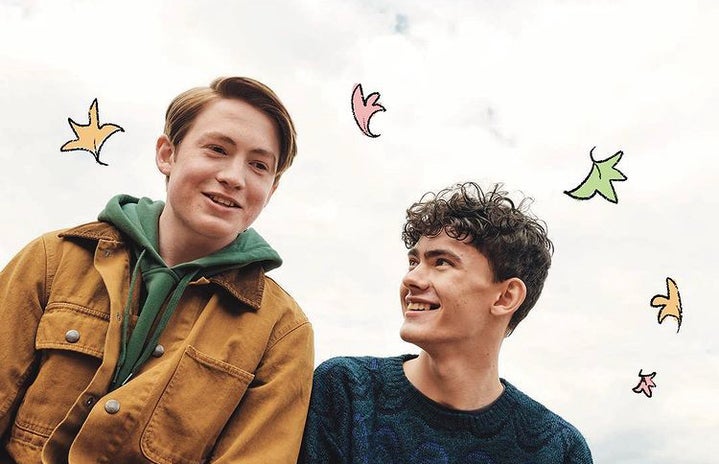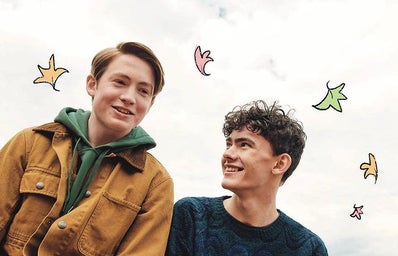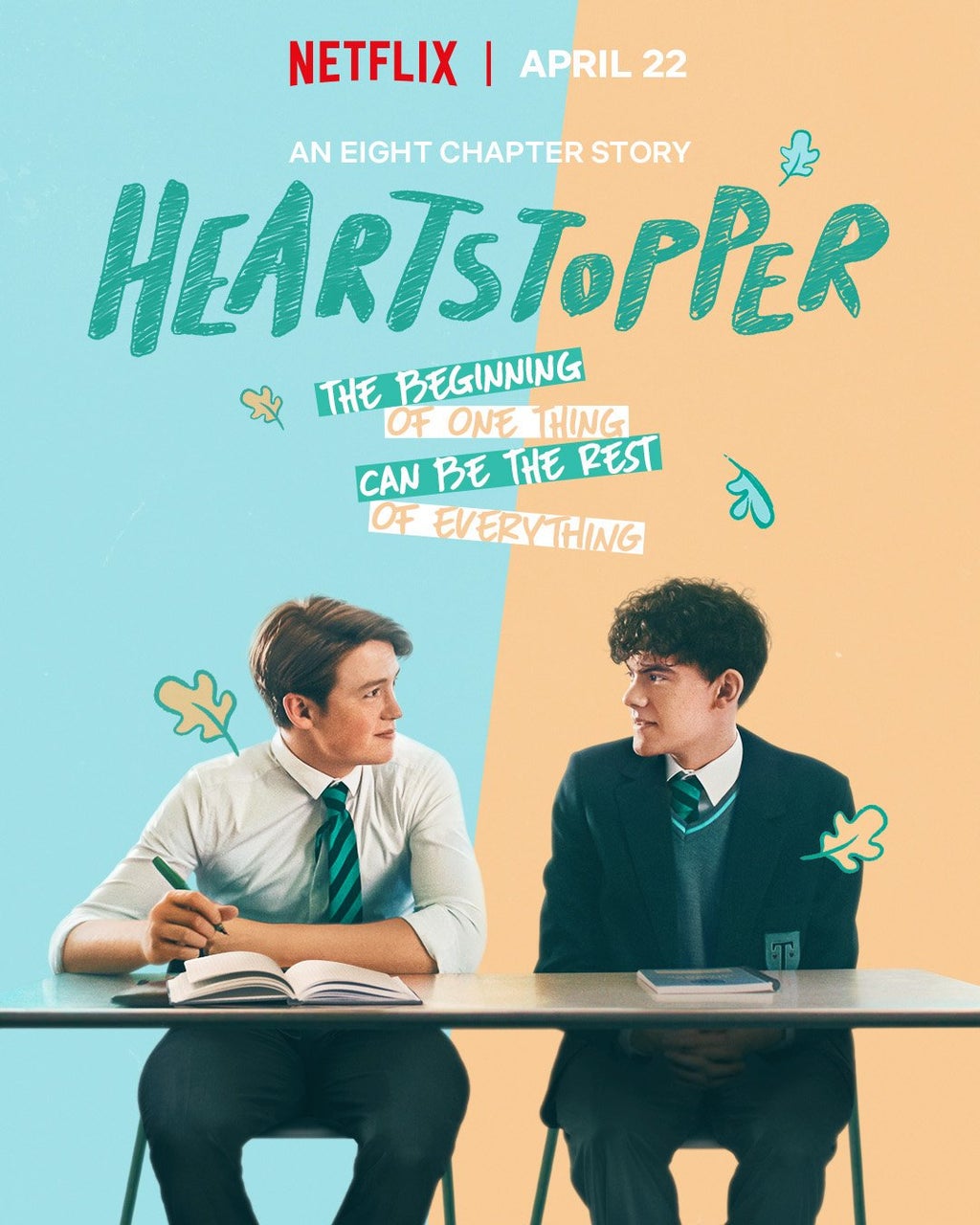Netflix’s new hit, “Heartstopper” is the sensation of the moment and rescues a long-needed precept about the representation of the young gay community on screen.
Addressing minority stories on TV soon became a challenge. When it comes to scripts focusing on the LGBTQIA+ community on television, one can follow these challenges almost “live”. After all, it is very recent that these stories gain prominence in the series. The existence of gay characters on TV is nothing new (at least in the North American context, because in Brazil it’s another story…), but certain approaches to narratives about same-sex couples are still surprising.
Based on Alice Oseman’s self-published webcomic, the series follows Charlie (Joe Locke), a 14-going-on-15-year-old boy at a British all-boys school. He’s queer, but coming out wasn’t his choice, people just found out, but things are going pretty okay, we think at first. Then he meets Nick (Kit Connor), a classmate in the year above him—a rugby player with the demeanor of a golden retriever who is presumed to be straighter than straight. Spoiler: well, he’s not. While still at school, the pair will face what so many other loves face: the approval of their friends, personal insecurities, and then, fulfillment.
The story of Nick and Charlie is as cliché as it gets: two young people who fall madly in love. The story is seen thousands of times with straight couples, surprisingly becoming a novelty when seen with young gay men. Not for nothing, after all, homosexual love on TV has been far more associated with trauma and tragedy than with any optimism. “It’s kind of the core concept of what Heartstopper is, and it’s the same in the comics,” says Alice Oseman for Vanity Fair. “It’s always about exploring real issues that can be dark—real, serious things that happen to people—while also keeping the tone positive, optimistic. It’s really difficult to get that balance.”
The show, which premiered in late April on Netflix, has a 100% rating with critics on Rotten Tomatoes. Viewers streamed it for almost 24 million hours in the week between April 25 and May 1. There’s no question that Heartstopper has connected everyone. But how “Heartstopper” is a game-changer for queer representation?
Every single detail of “Heartstopper” has been carefully, respectfully, and truthfully to the comics – from its authentic casting (each casting call was restricted to the exact sexual identity and ethnicity of the characters in Alice’s literary series) to the pioneering story-telling of the everyday experiences LGBTQ+ have lived through, but never get told. It is worth remembering that the series still has lesbian and transgender characters. They would gain from the moment they could see themselves and see that things just might work out. And also see this almost utopia of gay youth, with healthy relationships and family support. The genre of teen romance is part of the history of the series, yet “Heartstopper” presents a novelty in the vein.
“I screamed when I saw [the casting call], because I was like, What is going on? It’s like, a trans girl of color, she’s brown, she’s in school—she’s me. It was just an overwhelming sensation of like, This is my time. This is the trans community’s time to have somebody that they can look up to in the media,”
– Yasmin Finney, who plays Elle in the series, to Vanity Fair.
“Heartstopper” stays positive as it tackles potentially traumatic issues like bullying, homophobia, coming out, and the age-old general angst of being a teenager. Every LGBTQIA+ person would gain (and a lot) if they had the opportunity to watch Heartstopper as a young person. “I have never seen any teenage series or movie before that I felt so represented in. I wish I had seen a series like this when I was younger.”, said Guilherme Giaretta.
And for much of the audience, Heartstopper will succeed because of exactly that: the connection. An optimistic story of young gay men who manage to overcome all their traumas and fears with support and acceptance is still something that many feel the need to witness.
“I think one of the reasons why people are enjoying Heartstopper is because it feels quite real, although it is very sort of rose-tinted and focuses on love and joy and happiness. It makes the positive parts feel real, and it shows that they can be real. So yeah, I would never be the one to say, let’s tone down the darkness. The darkness makes the light.” says Oseman.
Many LGBTQ+ people will never know what it would have been like to grow up with a series like Heartstopper, to have been heard, to have their teenage years recognized and celebrated.
“I love how the script talks about queer love, which a lot of people still don’t write about. I love how unapologetic the queer love is in ‘Heartstopper’. The characters are never sorry about who they are, and they’re never ashamed to be themselves. It’s so empowering to see! The atmosphere on set was always happy and upbeat, and just excited to be creating a queer story with nuance. It was such a supportive environment that shines through in the show.” – Joe Locke for GQ
Thankfully, the LGBTQ+ generations going forward will. They’ll be taught that being queer isn’t a life destined for doom, tragedy, or even death, but your life can and hopefully will be packed with love, friendship, and a chosen family who would do anything for you. “Heartstopper” is a life-changing moment for the LGBTQ+ people of today and all the ones who will follow.
“There are so many aspects of queerness and queer love that no one has ever written about. It’s just so great to be part of a show that will hopefully open doors for other people to feel more comfortable writing queer stories. I want younger queer audiences to know that it’s okay to celebrate who they are. Queerness is beautiful.”
– Joe Locke (Charlie) for GQ.
———————————————-
This article was written by Giullia Cartaxo and edited by Amanda Oestreich.
Liked this type of content? Check Her Campus Cásper Líbero‘s home page for more!



